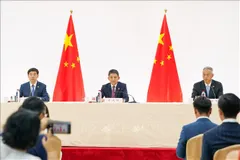
These articles drew strong comments from financial expert Dr. VÕ ĐÌNH TRÍ, who is at present a lecturer at the IPAG Business School in Paris in France. The editorial board of Saigon Investment shares some of these comments below.
According to Dr. Trí, the Personal Income Tax in a country is an important source of revenue when seen in the perspective of revenue that supports the state budget. However, due to changes in the current socio-economic environment, this tax policy needs to change to harmonize with the growth target and balance with the budgets of governments. Like many other developing or low-income economies at present, Vietnam is currently facing a dire need to reform its PIT policy as soon as possible and without much further delay.
Harmonious tax policy
It is a fact that the budget expenditure of all countries in following years is usually higher than in previous years, and this increase must be offset mainly through taxes. The main tax sources are consumption tax, salary tax such as on social insurance, personal income tax and corporate tax. Based on the estimate of the budget expenditure, the income from individuals or businesses can be adjusted to suit the objectives of a government for a period of time. For instance, increasing taxes of individuals will help reduce taxes on businesses and vice versa. However, in order to harmonize this situation, governments are also interested in better tax efficiency as well as competitiveness in the international environment.
Efficiency is usually shown through simplifying of the tax policy, so that taxpayers can comply with the tax policy as well as manage tax collection through administration. For instance, one of the current pressing problems in the Personal Income Tax Policy in Vietnam is the 10% tax deduction on current income of VND 2 mln or more. The consequence of this problem is that the number of tax refund settlement dossiers are so large that they can overload the functions of the tax authorities. The proof lies in the fact that in the first six months of 2022, the Tax Department in Ho Chi Minh City received 722,553 tax finalization documents with the amount for tax refund request of around VND 201 bln.
For tax compliance, many countries have turned to online tax administration and tax management at source to reduce further tax loss. For instance, the income source of people in France such as from employment, investment, and savings are connected to an automatic information data exchange with tax authorities. At the time of tax declaration, people need to just check whether the information is correct or not and whether there is a need to add or modify anything on their tax documents.
To put it briefly, the PIT policy is used by some countries as a tool to attract or keep high-income people to stay on. In this way, many countries attract high-income people with very low tax rate policies or in some cases even complete tax exemption. On the other hand, there are countries with high tax rate policies that cause many high-income people to look for loopholes and ways to avoid taxation by even showing a change of their permanent address or sometimes even their nationality, as was in the high-profile case of the French actor Gérard Depardieu.
A good tax policy must meet the criteria of simplicity, fairness, efficiency, high compliance, as well as increase the competitiveness of an economy. When designing a PIT policy, management agencies in a country should consider important factors such as tax units, tax rate brackets, deduction levels, tax compliances and the entire management process.
Vietnam needs tax reform
Since people and businesses are the two main sources of taxation, the proportion of each type of tax in the total budget revenue or the share of each tax in GDP is the indicator that would interest most people. According to a calculation made by the International Monetary Fund (IMF), the share of PIT in developed economies in GDP showed a decrease in the period 1990 until 2010 and is now on a slightly upward trend. However, in developing economies, this index only tends to increase, and the growth rate is faster than in low-income countries. If we look at the ratio of PIT to GDP, it is clear that in developing countries like Vietnam this index continues to increase.
However, the majority of people today are interested in PIT as tax rate, taxable income, and fairness in taxation. Many countries, including Vietnam, are applying a progressive tax policy, with many different tax rates in tier form. In Vietnam, there are currently seven levels, which now many people want to reduce to just five levels as in many other countries, because if they keep the same level the lower income group will have to pay much more.
Taxable income is also affected by deductions and inflation. The deduction may be a fixed amount but under the pressure of inflation many people find their real income reduced, while the taxable base does not always adjust and keep up. Not only this, but inflation also increases the nominal income of a taxpayer, placing such people in a higher taxable bracket.
It is a fact that the process of reforming the PIT policy is often an attractive yet controversial topic, both politically and economically. In a report by the Organization for Economic Co-Operation and Development (OECD) on this topic, its conclusion shows that tax trends among countries in this group is to reduce the tax rate but expand the taxable base, although the specific policies of each country are very different. Given the current shortcomings in the Personal Income Tax Policy of Vietnam, the direction that tax reform should take is to focus on the tax rate bracket, taxable basis, and flexibility in choices for taxpayers.
The increase in income from PIT is reasonable and understandable in the context that the budget expenditure of the Governments in general and Vietnamese Government in particular has to increase year by year. However, the increase in revenue comes not only from tax policy reform but also from the growth in the economy and the income of the general public. When the economy grows and the incomes of people increases, the income from PIT will also increase, especially in the developing countries.



















